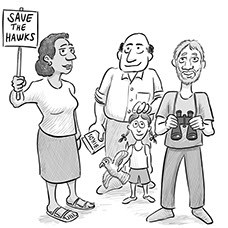SciGen Teacher Dashboard
Unit L1
Populations in Balance
 Conversation: Town Hall Meeting
Conversation: Town Hall Meeting
Duration: Approximately 65 minutes
Simulate a town hall meeting with presentations and careful observation of other viewpoints.
LEARNING OBJECTIVES
Students will construct an explanation that predicts patterns of interactions among organisms across multiple ecosystems, especially competitive, predatory, and mutually beneficial interactions.
Students will construct an argument supported by empirical evidence that changes to physical or biological components of an ecosystem affect populations.
Teacher Tips
- Review the focus words of the week. The focus word chart linked on the unit overview page should be used as a resource for students to review definitions and sample sentences.
- You can print out the "Banned" poster pictured at right for your door for some scene setting. Available as a PDF and a Word document.
Teacher Tune-ups
Teaching Notes
ACTIVITY OVERVIEW
- Set the context for the activity (10 minutes)
- Prepare for the Town Hall meeting (15 minutes)
- Run the meeting (30 minutes)
- Give feedback (10 minutes)
Set the context for the activity (10 minutes)
Meet the Community
Groups will prepare:
- an opening statement
- arguments to support the position
- comments or questions for other attendees
- a closing statement
Display slides.
Paraphrase:
Today our class is going to simulate a town hall meeting.
Here’s the situation: just as Maria thought, hawks are indeed helpful in controlling mice and other rodents. Therefore, the fish and game warden of Cluck County made a new rule and put up the sign shown on the right.
Of course, different people in the community have different opinions about this new rule.

The farmers

The environmental activists

The fish and game warden and wildlife biologists

The county councilors
Prepare for the Town Hall meeting (15 minutes)
Students use this time to prepare for the town hall meeting simulation.
Paraphrase:
There will be two town hall meeting simulations. You will participate as a character during one of them. During the other, you will observe and fill out a checklist.
Display the Town Hall overview on slides.
Divide the class into four large groups. Assign each group a type of “meeting attendee.”
- farmers
- environmental activists
- game warden/biologists
- county councilors
- make an opening statement that includes arguments for its position
- make comments to or ask questions of other attendees
- make a closing statement that reinforces arguments
Each group reads the mindsets of each attendee and prepares an argument for their particular attendee. Each team should decide the following:
- who is going to attend meeting one and meeting two (half for Meeting 1, half for Meeting 2)
- who will present opening statement
- who will present closing statement
- who will ask/answer questions of other attendees
Run the meeting (30 minutes)
Students use this time to prepare for the town hall meeting simulation.
Paraphrase:
There will be two town hall meeting simulations. You will participate as a character during one of them. During the other, you will observe and fill out a checklist.
Display rules on slides.
Divide the class into four large groups. Assign each group a type of “meeting attendee.”
- farmers
- environmental activists
- game warden/biologists
- county councilors
Each group reads the mindsets of each attendee and prepares an argument for their particular attendee. Each group should decide who will attend and present at each meeting.
Paraphrase:
While an observer, you should study the observation checklist and take notes as you hear good points from the different teams/mindsets. Circle any focus words you hear used by a team during the meeting. Write a check mark when you hear someone from a team make a good point. Jot a few words to remind yourself of any really good points. Attempt to note at least one good point from each team in the other group. Be ready to comment on what you observed after the simulation.
Town
Hall
Agenda
county councilors share ground rules
opening statements
comments / questions
closing statements
Give feedback (10 minutes)
BETA Version - Please send comments and corrections to info@serpinstitute.org